Iranian Women Must Be Able To Choose - European Commission
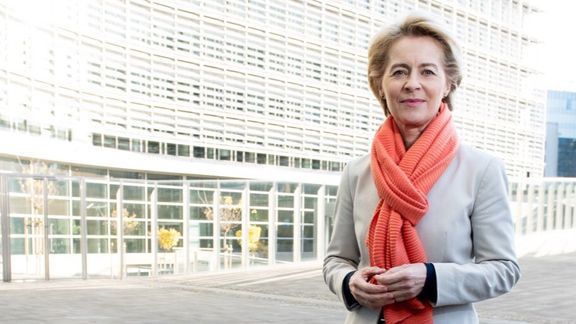
The president of the European Commission has called on Iranian authorities to stop the violence against protesters, saying “women must be able to choose.”

The president of the European Commission has called on Iranian authorities to stop the violence against protesters, saying “women must be able to choose.”
Ursula von der Leyen said Wednesday that “The brave Iranian women demand freedom and equality -- values that Europe believes in and must speak up for.”
Describing the current uprising in Iran sparked by the death in custody of 22-year-old Mahsa Amini as "a cry for equality and women's rights," she said Europe's message must be “crystal clear.”
Noting that the “shocking violence” by the Islamic Republic's repression machine “cannot stay unanswered," she reiterated calls for sanctions on those responsible for the clampdown. “We have to work on sanctions together.”
Last week, the European Parliament adopted a resolution condemning Mahsa Amini’s killingand instructing all member states “to use the mechanisms envisaged in the EU Guidelines on Human Rights Defenders to support and protect” protesters.
The European Union has not given any indication of what sanctions may be agreed at the foreign ministers’ meeting on October 17. German Foreign Minister Annalena Baerbock told Bild am Sonntag, a Sunday newspaper, that Berlin would support measures freezing the assets and banning the EU entry of those responsible for “brutal suppression,” referring to antigovernment protests.
The bloc last agreed to human rights sanctions on Tehran in 2021. No Iranians had been added to that list since 2013, however, as the bloc has shied away from such measures in the hope of reviving a nuclear accord with Iran after the United States withdrew in 2018. Those talks have now stalled. It currently has an array of sanctions on about 90 Iranian individuals which have been renewed annually every April.
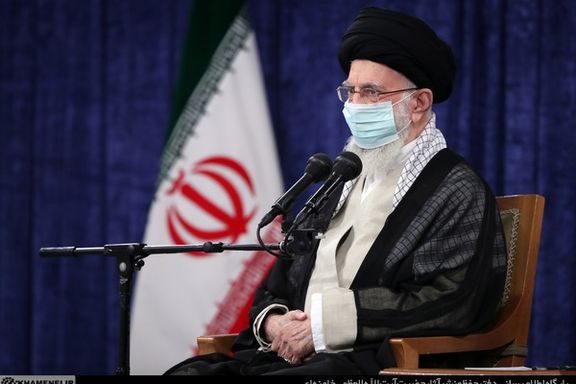
While protests are raging across Iran Wednesday, Islamic Republic’s ruler Ali Khamenei called the uprising "scattered riots" designed “by the enemy.”
Khamenei, who had already tried to downplay the antigovernment protests last week, made the remarks on Wednesday as protests began in major cities across the country amid a near total internet shutdown and choppers hovering above Tehran. Earlier in the month, he claimed protests were planned by the US and Israel and not staged by "ordinary Iranians."
"These scattered riots are the passive and clumsy design of the enemy against the great and innovative developments and movements of the Iranian nation," the Supreme Leader said.
Without providing any explanation, he said, “The Iranian nation made great moves in a short period of time, which were 180 degrees opposite to the global arrogance’s policies, and they were forced to react,” referring to the United States and other Western powers.
Describing the protests, that are garnering more support from the international community, as a “minor incident,” he said, “The constructions, great executive works, effective legislation, big judicial works, and important issues in foreign policy should not be sidelined by these minor incidents.”
Tehran Youth, presumed to be a group of young activists who have taken the lead in current protests issued the call for Wednesday’s nationwide protests after security forces used military weapons against protesters in the Kurdish city of Sanandaj earlier this week.
Protests over the death of Mahsa Amini, a 22-year-old Kurdish Iranian woman who died in the custody of the hijab police, started in her hometown Saqqez and capital but soon spread all over Iran.
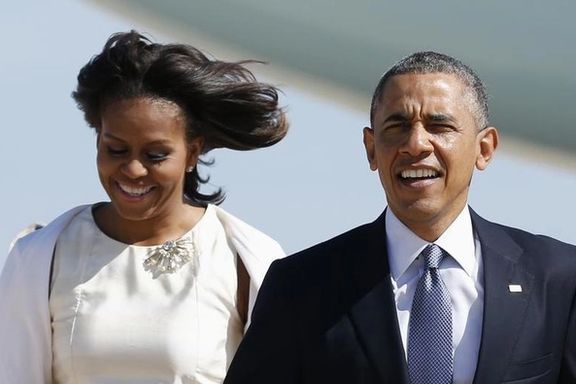
Former US President Barack Obama and first lady Michelle have expressed solidarity with Iranian women and girls who have “inspired the world” through their protests.
The Obamas issued a statement Tuesday on the occasion of International Day of the Girl, saying they are "in awe" of those who have joined the reignited fight for women's rights in Iran.
Condemning the clampdown on popular uprising sparked by the death in custody of 22-year-old Mahsa Amini, they said, "The rights they seek are universal: equality, the ability to make their own choices about how they look and dress and express their identities, and the freedom to do so without facing harassment, intimidation, and violence.”
Addressing protestors, the Obamas said, "We are moved by your acts of protest, and bear witness to your bravery in facing down the brutality of a regime resisting calls for change. You are delivering a powerful message that injustice should not be tolerated."
They sympathized with those who have tragically lost loved ones and expressed hope that “the future will ultimately belong to the young women and girls of Iran who are refusing to be silent.”
“You remind us that true power comes not from clinging to the past, but from the effort to build a better future," they said.
Earlier in the month, President Joe Biden said, “The United States stands with Iranian women and all the citizens of Iran who are inspiring the world with their bravery."
Amid a near total internet shutdown across Iran and government helicopters circling above Tehran on Wednesday, protests are going on.
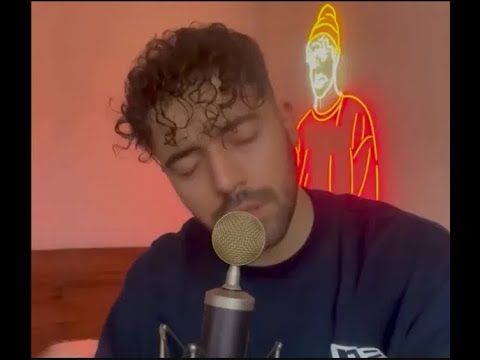
Iranian protest song by singer-songwriter Shervin Hajipour, which has become the anthem of the current uprising, has flooded the submission box for the Grammys’ newest special award category.
The song “Baraye...” -- which means “For the Sake Of” in Persian -- received 95,000, or over 83 percent, of the 115,000 total submissions for the award following a campaign on TikTok urged users to nominate the song, which is the de-facto manifesto of the protests.
It has been reuploaded to YouTube and other social media platforms, and “was used by Iranians all over the world as a rallying cry,” a crowdsourced guide for nominating the song for a Grammy says.
The special merit award is meant to honor a song “that has had a profound social influence and impact,” the Recording Academy said on its website. Submissions are open through October 14.
The Recording Academy was “deeply moved” by the social media campaign, Chief Executive Officer Harvey Mason, Jr. said in an e-mailed statement. “While we cannot predict who might win the award, we are humbled by the knowledge that the Academy is a platform for people who want to show support for the idea that music is a powerful catalyst for change.”
Hajipour, who shared his song amid the protests over Mahsa Amini’s death in custody of hijab police, was himself arrested and released on bail and later was banned from leaving Iran on charges of anti-regime propaganda and inciting violence. He composed the song from tweets and other social-media posts from protestors commemorating Mahsa Amini.

United States Middle East policies are under renewed focus after President Joe Biden said Saudi Arabia faced “consequences” over the OPEC+ cut in oil output.
In his CNN interview Tuesday, Biden did not endorse a call from some Democrats to downgrade relations with Riyadh. Neither did the US president back draft legislation from Senator Richard Blumenthal and House member Rohit Khanna to pause arms sales to the Saudis for a year.
But with the Democratic Party fearing higher gasoline prices will harm its chances in November 8 midterm Congressional elections,Biden addressed concerns that the Saudis had agreed the 2-million-barrels-a-day output cut with Russia, the other leading OPEC+ member, just as the US is backing Ukraine against Russia militarily.
Senator Robert Menendez, a New Jersey Democrat, cited the OPEC+ decision in vowing as chairman of the Senate Foreign Relations Committee to work against future arms sales to the Saudis. There are also Democrat concerns over Saudi Arabia’s human rights record, at home and its seven-year armed intervention in Yemen where its economic blockade of the country has left 3.5 million people acutely malnourished.
Biden came to office in 2021 pledging to hold Saudi Arabia accountable for the 2018 murder of Washington Post journalist Jamal Khashoggi, only to famously ‘fist-bump’ July Saudi Crown Prince Mohammad bin Salman al-Saud, whom US intelligence assesses was likely responsible for the killing.
Saudi relations and Iran
But as nuclear talks with Iran have faltered and Tehran is harshly suppressing popular protests at home, the question arises if any attempt to downgrade relations with Saudi Arabia would not present opportunities to Iran in the region.
Asked this question Tuesday, State Department spokesperson Ned Price answered, “we won’t take our eye off the threat that Iran poses not only to the region but in some ways beyond. You have seen us…respond and take action…against the malign actions and malign influence that Iran has perpetrated, that Iran has attempted to export throughout the region.”
But plans for organizing joint regional air defense against potential Iranian missile and drone threats, as well as other joint efforts might suffer if there is a cold spell in Washington-Riyadh ties.
Price also emphasized US responses to popular protests in Iran, including sanctions on some officials. Amnesty International has reported that Iranian security forces killed at least 130 protestors in late September, including 88 in the south-east province of Sistan-Baluchistan. Washington, Price said, aimed “to support these brave Iranians…across Iran’s cities and towns who are exercising peacefully their universal rights.”
‘Assassination plots’
Critics of the 2015 Iran nuclear deal, the JCPOA (Joint Comprehensive Plan of Action) which the Biden administration has worked to revive, and supporters of Saudi Arabia, have criticized calls for downgrading US relations with Riyadh.
“I don’t remember hearing from some voices who are calling for the US to cancel meetings with Saudi Arabia…after Iran plotted to assassinate Americans on US soil while US took part in JCPOA negotiations in Vienna,” tweeted Jason Brodsky, of the advocacy group, United Against Nuclear Iran, Tuesday, referring to reports from US law enforcement about Iranian involvement in a plot in 2021 to kill former US National Security Advisor John Bolton and threats against others.
Saudi Foreign Minister Faisal bin Farhan Al-Saud told Al-Arabiya television Tuesday that Riyadh’s thinking over cutting oil production was “purely economic.” Some Democrats and Saudi dissidents have pointed to the Saudis’ relationship with the entourage around former President Donald Trump and suggested the move was instead aimed at influencing the US elections.
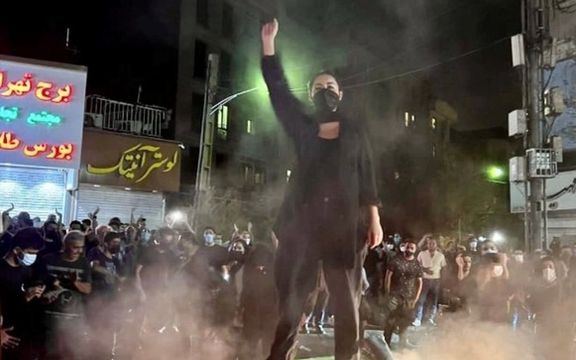
Iran’s interior minister Ahmad Vahidi Tuesday claimed that overthrowing the Islamic Republic “is a stupid idea” because the regime is at “apex of its power”.
The minister was visiting the western city of Sanandaj where protesters have been defying hundreds of government troops and gunmen for at least three days. There are no clear figures about casualties in the city but several people have been killed and dozens injured by live fire.
Reports by activists on social media indicated that the wounded have been turned away form hospitals, or they have refused to seek help knowing that doctors are under orders to call security agents when a wounded person is brought in. The government arrests them on the spot before they are treated and taken to prison.
Demonstrators were chanting and bullets flying in Sanandaj as the interior minister was apparently inspecting a water project in the area. The city has a majority Kurdish population and was one of the first spots where protests started in mid-September, following the killing of Mahsa Amini in the custody of Iran’s notorious hijab police.
There were also bloody protests in other Kurdish-populated cities and towns such as Baneh and Saqqez, the hometown of Mahsa Amini. These protests were continuing Tuesday night at the time of this writing.
Strikes by oil and petrochemical workers that started Monday continued in some spots on Tuesday, notably at the oldest refinery in the Middle East in Abadan, near the Persian Gulf. There were also strikes in Asalouyeh, a city which is home to many petrochemical and natural gas plants.
A video released by striking workers threatened destruction of plants and equipment if the Revolutionary Guard and its various armed groups do not lay down their weapons and stop killing civilians in the country.
Wednesday can become another milestone in the 26-day old antigovernment protest movement that clearly has assumed features of a revolutionary push to overthrow the clerical regime in Iran. A group of activists known as ‘Tehran Youth’ have called for nationwide protests on Wednesday. This was the group that had called for the large protests on Saturday, October 8, which brought out crowds in various parts of Tehran and several other cities, showing the power of the “revolutionaries”.
The call for another round of nationwide protests starting at noon October 12 came as a response to government violence in Sanandaj, amid a mood of national unity against the Islamic Republic. Protesters proudly highlight slogans of mutual support, especially for outlying regions such as Kurdish areas close to Iraq and the Baluch city of Zahedan which is located at the opposite end of the vast country, near Pakistan.
The Baluch region is a neglected and poor part of Iran, where security forces more likely felt they could kill more indiscriminately on September 30 when around 60 protesters were gunned down in Zahedan. The death toll has now risen to around 90.
No one knows exactly how many people have been killed nationwide, but some human rights groups put the figure at close to 200. Security forces have also arrested between four to five thousand protesters, including many university students and even school children.